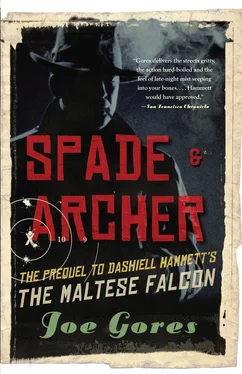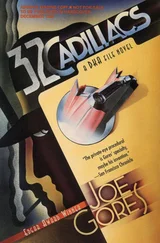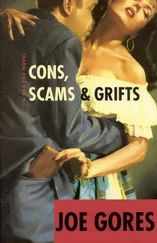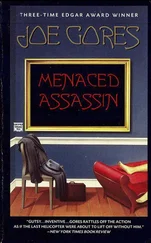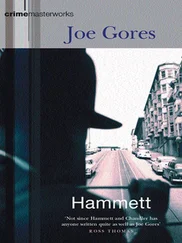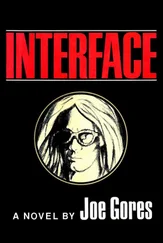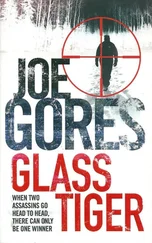“Did he?”
Kentzler looked surprised. “I don’t know. But I do know that once you know rich, you don’t want to know poor again. I think she could be the sort of widow who’d fill up those pockets you talk about by defrauding the insurance company.”
“Dear, you’re in trouble at the bank and you’ve got this huge life insurance policy, so let me help you poison yourself?”
“You can laugh, but even so—”
“You’re saying there was?”
“What?”
“Collusion on her part?”
“How the hell do I know? I just want to find out one way or the other. If everything’s jake, then OK, the wife honestly should get her big payoff. If it’s suicide I want to keep her from getting one thin dime.”
“What do the forensics say?”
“Unclear. Natural causes, suicide, even murder — it could have been any of them. But who except the wife would benefit if it was murder, and how would she have rigged it? That’s why I dragged you down here today. You did such a good recovery job for us on that Pasadena bearer-bond theft—”
Spade grinned sardonically and returned to his chowder. Kentzler finished his oysters and began slathering butter on a warm, light-as-air popover.
“OK, I’ll skip the soft soap, Sam. I came to you because you’re tough, nasty, smart, and bullheaded. I’ll be sending a copy of the autopsy report over to your office on Monday.”
“It’s a man. He’s dead. That’s all I need to know unless something in the report shows that someone else made him dead.”
“There’s something screwy about the Eberhard death,” said Kentzler gloomily. “I just can’t put my finger on it. At the coroner’s inquest it was suggested that maybe he died of asphyxia with cerebral congestion. Or maybe he died of shock. Or maybe he died of a stroke.”
“Or maybe he died of old age at age forty-nine.”
“The only really sure thing about it is that Collin Eberhard did not die by drowning. No water in the lungs.”
“So he didn’t die by drowning.” Spade began rolling a cigarette while Kentzler called for the dessert menu. “But how do we get from there to suicide — or murder? I take it there was indeed cerebral congestion but no fracture of the cranial bones. Anything in the stomach to suggest that he was poisoned?”
“Nothing. But during the inquest the coroner said that a preparation of opium could produce cerebral congestion, kill you quickly, sometimes without leaving any mark on the stomach wall.”
“If he wanted to kill himself and hide the fact, why not just accidentally fall off a ferryboat some foggy night? If he was poisoned — and you say there’s no physical indication of that — I’d as lief say it was murder as suicide. But murder wouldn’t get Bankers’ Life off the hook, would it?”
“No,” mumbled Kentzler around a big mouthful of chocolate cake. “But the coroner’s jury was composed entirely of Eberhard’s friends, who ignored the puzzling details and said it was a stroke as a result of cerebral congestion that killed him. We have privately almost decided on a settlement with the wife, even though the possibility of poison has not been ruled out.”
“All I know about poisons is what I read in The Count of Monte Cristo when I was a kid. Take a small but increasingly larger dose of arsenic every day and you build up an immunity to it. I don’t even know if that’s true of arsenic, let alone opium.”
“Sausalito, four years ago,” said Kentzler. “You were involved in a case where two men were poisoned in connection with the gold theft off the San Anselmo.”
Spade’s face changed, darkened. “St. Clair McPhee,” he said. “Disappeared without a trace.”
“And that bothers you? After all this time?”
“I keep an almost-empty file on him,” Spade admitted almost ruefully. “I hate being made a sucker of. Someday I’ll figure out where he went, and how, and I’ll find him...” He shrugged. “It was the Marin coroner who said the two Portagees were poisoned, not me. I never even read his autopsy report.”
“Well, you’re going to read this one,” said Kentzler.
At 8:30 Monday morning Sam Spade bounded up the stairs to his office above Remedial Loans on Mission Street whistling “Gut Bucket Blues” slightly off-key. He found Effie Perine staring with uncomprehending eyes at an oblong of colored paper.
“What’s this, Sam?”
He went around behind her desk to look at it over her shoulder as if he had not stuck it between the pages of her shorthand pad after she had gone home on Friday night.
“A check for fifty bucks. Last week’s wages.”
“I don’t make fifty dollars a—”
“It’s nineteen twenty-five. Yesterday was your twenty-first birthday. Today you can vote. Today you can make fifty bucks a week. How was the surprise party your Greek friends threw for you Saturday?”
“How did you know about that?”
“Your mother called on Friday to make sure I wouldn’t have you working over the weekend.” He paused in the doorway of his office. “You’ll earn it, sister, and then some. Any calls?”
She slowly settled back in her chair. “No. But a document was delivered by messenger from Ray Kentzler.”
“It’s an autopsy report. Open a file on Eberhard, Collin. Leave the ‘Client’ space blank, but it’s Bankers’ Life.”
Her face lit up. “They’re saying he poisoned himself.”
“They’re probably wrong. But see can you round up the newspaper coverage on Eberhard since his death.”
Spade went down a long brown linoleum hallway on the ground floor of the Hall of Justice in Kearny Street, his footsteps echoing hollowly. Motes of suspended dust moved with him as he went in the door marked CORONEr’s OFFICE.
Behind the anteroom desk was a middle-aged woman with gray hair pulled into a bun held in place by a tortoise-shell comb. She wore a shapeless gingham apron frock with a square-cut collar. Flowers doing poorly on the left front corner of the desk did little to brighten the room.
She looked up from typing a form to ask sharply, “Yes?”
“Dr. Leland, please. About the Collin Eberhard autopsy.”
“The coroner is in conference. The chief deputy is in conference. The assistant deputies are in conference.”
“This is a public office. I’m a citizen. I’ll wait.” He took a chair against the wall, leaned back, stuck his legs out straight in front of him, crossed them at the ankles, and tipped his hat down over his eyes. He began to hum, very softly, “Sweet Georgia Brown.”
She said almost shrilly, “If you don’t stop that I’m going to call upstairs for a police officer to escort you—”
Spade lifted his hat to say, “Try Tom Polhaus in Homicide.”
He lowered the hat again. He resumed his humming. After long moments her chair creaked. He raised his hat brim enough to see her disappearing through the door behind her desk. Her dress was taut across an ample backside. He grinned, took off his hat.
Ten minutes later she reappeared, followed by a square, chunky man with a wide face and dark hair low on his forehead. He jerked a thumb at Spade. “You. In here.”
Spade sauntered across the room, bowing slightly to the woman as he passed. He followed the man through a suite of offices to a cubicle with no windows and a lot of paperwork on a battered blond-wood desk. The room smelled of cigar smoke and, very faintly, disinfectant. The square man sat down behind the desk. He did not offer to shake hands, instead tented his fingers, half-sneered as Spade sat down across from him.
“Assistant Deputy Coroner Adolf Klinger. We’re sick of you newshounds coming around with your lies and innuendos. The coroner’s jury has rendered its verdict upon the Eberhard matter. Natural causes. We have released the body for burial. Period.”
Читать дальше
